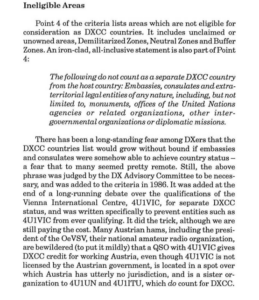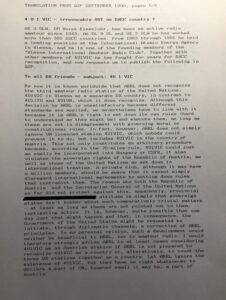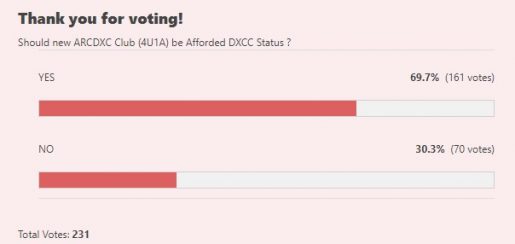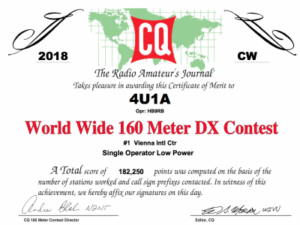“The ARCDXC is pleased to publish the documentation regarding our 4U1A petition. Although previous submissions were met with a preference for maintaining the status quo, we believe the legal and historical facts presented here deserve a formal and thorough evaluation. Our goal remains the same: to address long-standing inconsistencies and to assist the DXAC and ARRL leadership in bringing the DXCC list into alignment with the unique status of the Vienna International Centre.”

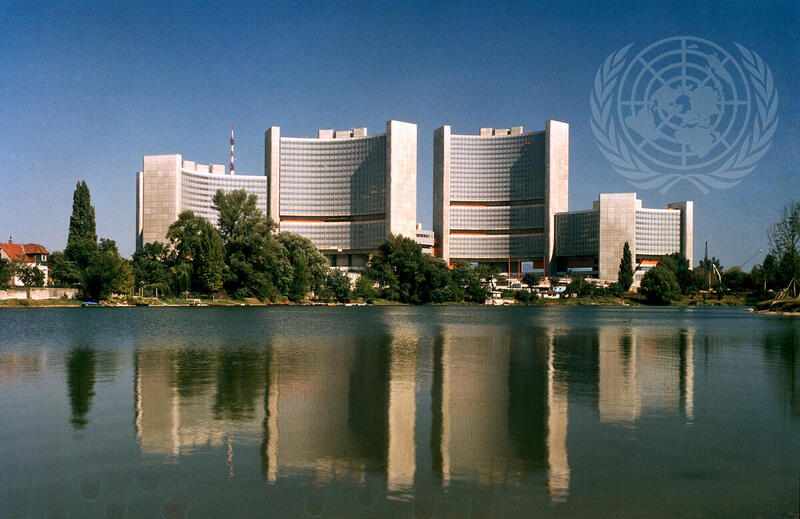
THE GENESIS OF ARCDXC (4U1A): PRESERVING A LEGACY, BUILDING THE FUTURE
The Foundation: The 4U1VIC Era
The history of amateur radio at the Vienna International Centre (VIC) dates back to the early 1980s. Following the relocation of major UN organizations to Vienna in 1979, the Vienna International Radio Club was officially formed in May 1980. Operating under the historic callsign 4U1VIC, the station first breathed life into the airwaves in September 1982. For decades, 4U1VIC stood as a symbol of international cooperation, connecting the UN community in Vienna with the global amateur radio world.
A Period of Transition
As with many long-standing institutions, the passage of time brought administrative and structural shifts. After years of successful operations, the original club structure reached a turning point. However, the spirit of the “Vienna UN station” and its vital importance to the international DX community could not be allowed to fade into history.
2015: The Rise of ARCDXC (4U1A)
In September 2015, a new chapter began. Recognizing the need for a modern, contest-oriented, and professionally managed organization, the Amateur Radio Contest DX Club (ARCDXC) was officially registered by the VIC Recreation Council (VICREC) of the United Nations in Vienna.
Born from the foundational legacy of its predecessor, the ARCDXC was not merely a replacement, but a revitalization. This new initiative was met with high-level support:
-
Official Recognition: The club was granted formal authorization to represent the United Nations radio community in Vienna.
-
A New Callsign: In a significant nod to its standing, the callsign 4U1A was officially authorized by the United Nations Headquarters in New York (USA), marking a new era of high-profile operations.
Restoring the “Third Pillar”
Today, the ARCDXC (4U1A) operates from the very same extraterritorial grounds that hosted 4U1VIC. We see ourselves as the legal and traditional successors to the pioneering work started in 1980. Our mission is to restore the “Vienna Pillar” of UN amateur radio, standing on equal footing with 4U1UN in New York and 4U1ITU in Geneva.
By combining the rich history of the early 80s with a modern commitment to excellence in DXing and contesting, 4U1A continues to be a beacon of the UN spirit in the global ham radio spectrum.

At the invitation of the Government of Austria, the International Atomic Energy Agency (IAEA) and the United Nations Industrial Development Organization (UNIDO) established their headquarters in Vienna in 1957 and 1967, respectively. In the 1970s, the Government provided a permanent residence for those two organizations: the Vienna International Centre (VIC). To make full use of the new facility, other United Nations units were transferred to Vienna from New York and Geneva. Many of them were consolidated in the United Nations Office at Vienna (UNOV). Transferred from Beirut in 1978, the United Nations Relief and Works Agency for Palestine Refugees in the Near East (UNRWA) was provisionally headquartered at the VIC before it was relocated to Gaza City in 1997. In March 1997, the Preparatory Commission for the Comprehensive Nuclear-Test-Ban Treaty Organization (CTBTO) was established at the VIC.
In 1966, the Government of Austria made an offer to the United Nations to construct in Vienna an international centre to be used by organizations of the United Nations system. In 1967, the Government of Austria and the city of Vienna, in a joint decision, designated an area on the left bank of the Danube as the site of the centre. An international competition for the design of the buildings was organized in 1968. It attracted the interest of architects worldwide and resulted in 288 designs being submitted. The Austrian architect Johann Staber was eventually designated the winner of the competition. His design was announced on 18 December 1970 by the Chancellor of Austria. Construction began in 1972 under the general direction of the Internationaler Amtssitz und Konferenzzentrum Wien. The costs of constructing the VIC were shared by the Government of Austria (65 per cent) and the city of Vienna (35 per cent).
The VIC was inaugurated on 23 August 1979. Separate agreements were signed by IAEA and Austria and between the United Nations and Austria on behalf of UNIDO and the other United Nations entities in Vienna on 28 September 1979. The Government of Austria handed over the VIC complex to the United Nations and IAEA for the symbolic rental sum of one Austrian schilling (equivalent to 0.07 euro today) a year for 99 years.
The VIC complex, which covers an area of 180,000 m², has extraterritorial status. Maintenance and operating costs of the VIC are borne by the VIC-based organizations. The VIC comprises about 4,500 offices and 19 conference rooms and accommodates international civil servants from across the globe. The Y-shaped office towers are between 48 metres and 120 metres high.

THE INTERNATIONAL LEGAL STATUS OF THE VIENNA INTERNATIONAL CENTRE (VIC)
1. Juridical Personality and the “International Person”
The Vienna International Centre (VIC) is not merely a diplomatic outpost; it is a specialized headquarters seat for the United Nations and its affiliated agencies. Its legal standing is rooted in the “international personality” of the United Nations.
-
ICJ Precedent: In its landmark 1949 Advisory Opinion (Reparation for Injuries Suffered in the Service of the United Nations), the International Court of Justice (ICJ) ruled that the UN is an “international person” and a subject of international law.
-
Treaty-Making Capacity: While the UN is not a sovereign “State” in the traditional sense, it possesses the capacity to possess international rights and duties and to maintain its rights by bringing international claims and concluding treaties (Headquarters Agreements).
2. The Legal Basis of Extraterritoriality
The legal status of the VIC is defined by formal bilateral treaties between the United Nations and the Republic of Austria, primarily the Agreement regarding the Headquarters Seat of the UNIDO (Agreement No. 8679, 1967) and subsequent agreements for the IAEA and other UN entities.
-
Section 7 (Recognition of Extraterritoriality): The Government of Austria formally recognizes the extraterritoriality of the headquarters seat. The VIC is under the “control and authority” of the international organizations as provided in the agreement.
-
Section 8 (Legislative Independence): The UN has the power to make regulations operative within the VIC to ensure the execution of its functions. Any Austrian law inconsistent with a UN regulation is inapplicable within the headquarters seat.
-
Section 9 (Inviolability): The headquarters seat is inviolable. No official of the Republic of Austria (police, judicial officers, or tax authorities) may enter the VIC to perform official duties except with the express consent of the Executive Director.
3. Administrative Autonomy and Government Functions
The VIC operates as a distinct administrative enclave where “government” functions are shared between the host nation and the international organization, with the UN holding primary authority over internal affairs:
-
Legal Jurisdiction: While Austrian laws generally apply where they do not conflict with UN regulations, the UN manages its own security (UNSSS), internal labor laws, and disciplinary procedures.
-
Property Immunity: The property and assets of the UN within the VIC are immune from search, requisition, confiscation, and any other form of interference by executive, administrative, judicial, or legislative action.
4. Sovereign Communication and Postal Independence
One of the most significant indicators of the VIC’s unique legal status is its independence in the field of communications.
-
United Nations Postal Administration (UNPA): The VIC is one of only three locations worldwide (alongside New York and Geneva) authorized to host a UNPA branch. Under the agreement of June 28, 1979, the UN issues its own postage stamps denominated in Euros (formerly Austrian Schillings).
-
Treaty Recognition: The UNPA is the only postal authority in the world that is not a country or a territory but is permitted by international treaty to issue postage stamps. This signifies a high level of internationally recognized legal authority over postal and electronic communications.
5. Distinction from Diplomatic Missions
The legal status of the VIC transcends that of a standard embassy or consulate:
-
Representational Scope: An embassy represents one State to another. The VIC is a headquarters seat for intergovernmental organizations representing the entire world community.
-
Independence: Unlike an embassy, which relies on the host nation for most infrastructure and regulatory frameworks, the VIC possesses the “constituent power” to regulate its own environment, issue its own currency-equivalent (stamps), and enter into direct international agreements with other States regarding its operations.
Conclusion
The Vienna International Centre occupies a unique tier in international law. It is an extraterritorial administrative enclave possessing an international legal personality. Through its constituent documents and developed practice, the VIC exercises autonomous control over its territory, its administration, and its communications, placing it on an equal juridical plane with the UN Headquarters in New York and the Palais des Nations in Geneva.

History of the Vienna International Centre
- United Nations Office at Vienna (UNOV)
- International Atomic Energy Agency (IAEA)
- United Nations Industrial Development Organization (UNIDO)
- United Nations Office on Drugs and Crime (UNODC)
- Preparatory Commission for the Comprehensive Nuclear-Test-Ban Treaty Organization (CTBTO PrepCom)
- United Nations Office for Outer Space Affairs (UNOOSA)
- International Commission for the Protection of the Danube River (ICPDR)
- International Narcotics Control Board (INCB)
- International Organization for Migration (IOM)
- United Nations Scientific Committee on the Effects of Atomic Radiation (UNSCEAR)
- Sustainable Energy for All (SEforALL)
- United Nations Commission on International Trade Law (UNCITRAL)
- United Nations Environment Programme (UN Environment)
- United Nations High Commissioner for Refugees (UNHCR)
- United Nations Information Service (UNIS)
- United Nations Liaison Office for Peace and Security in Vienna (UNLOPS Vienna)
- United Nations Office for Disarmament Affairs (UNODA)
- The United Nations Postal Administration (UNPA)
- The United Nations Register of Damage Caused by the Construction of the Wall in the Occupied Palestinian Territory (UNRoD)
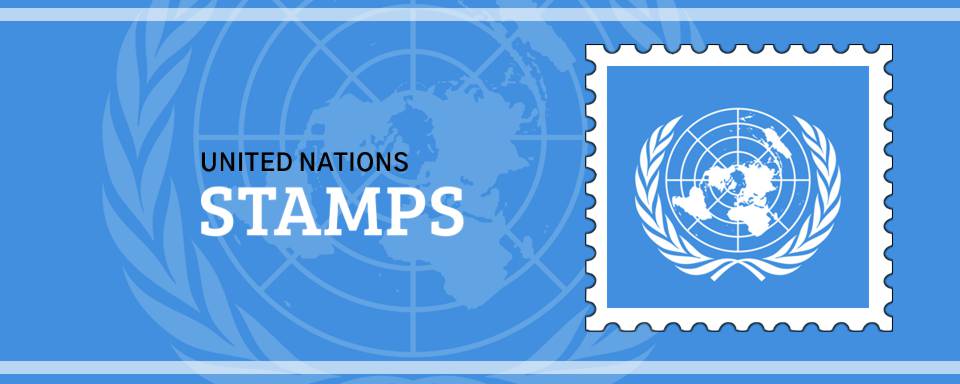
United Nations Postal Administration (UNPA)
On 24th August 1979, one day after the opening of the Vienna International Centre, the United Nations Postal Administration issued its first United Nations stamps in Austrian currency. The idea of the United Nations issuing its own stamps was first proposed by Argentina in 1947. An agreement with the United States postal authorities was reached in 1951 and it stipulated that the stamps be denominated in United States currency, and used only at United Nations Headquarters.
The first United Nations stamps were issued in US dollars denominations on United Nations Day, 24 October, 1951. The stamps were an immediate success and sold out within days. Similar postal agreements were reached with Swiss and Austrian authorities. Since 1979, United Nations stamps are issued simultaneously at United Nations offices in New York, Geneva and Vienna.
The United Nations stamps provide information about the aims and activities of the world organization like peace, health and environment. The stamps are available from UNPA offices in person or by mail, and from stamp dealers . They are valid for postage when used on mail from the United Nations offices in New York, Geneva and Vienna. Usually, six new commemorative issues are released each year and remain on sale for 12 months only. After that date, any remaining stocks are destroyed. They are never reprinted, even if they are sold out before the end of the 12-month sale period.
The Critical Role of the UN Postal Administration (UNPA) in the 4U1A DXCC Initiative
Executive Overview
A primary cornerstone of the 4U1A petition for DXCC recognition is the unique administrative status of the Vienna International Centre (VIC). Central to this status is the presence of the United Nations Postal Administration (UNPA). The VIC is one of only three locations in the world—alongside New York and Geneva—authorized to issue its own postage stamps.
1. Proof of Administrative Autonomy
The existence of the UNPA in Vienna is not merely a service; it is a declaration of sovereignty and administrative independence.
-
The “Three Pillars” of the UN: The UNPA issues stamps in three different currencies: US Dollars (New York), Swiss Francs (Geneva), and Euros (Vienna).
-
Regulatory Distinction: These stamps are recognized by the Universal Postal Union (UPU) as distinct from the postage of the host nation, the Republic of Austria. This provides irrefutable evidence that the VIC operates as a “Separate Administration”—a fundamental requirement under DXCC Rule 1(c).
2. The Historical DXCC Precedent
When 4U1UN (New York) was granted separate DXCC entity status, the ARRL placed significant weight on the fact that the UN Headquarters maintained its own postal system.
-
Consistency: If the ARRL acknowledges the New York headquarters based on its administrative and postal independence, the same logic must apply to the Vienna headquarters. Since 1979, the UNPA Vienna has maintained the same level of authority as its counterparts in New York and Geneva.
3. Inviolability and Extraterritoriality
The postal operations within the VIC are governed by the Headquarters Agreement, meaning Austrian postal laws and domestic regulations do not apply within the enclave.
-
Radio & Postal Link: Just as the UNPA operates under international mandate rather than domestic law, the amateur radio station 4U1A operates under the same extraterritorial authorization. The postal and radio operations are two sides of the same “administrative coin.”
4. Why UNPA Vienna Matters for DXCC
For the DX Advisory Committee (DXAC), the UNPA serves as the “Golden Key” to the petition. It proves that the territory:
-
Is not under the administrative jurisdiction of the host nation.
-
Is recognized internationally as an independent administrative unit.
-
Functions as a primary seat of the United Nations, equal in status to New York and Geneva.
Summary Statement for the Global Community
The recognition of 4U1A is not an attempt to create a “new” entity; it is an effort to align the DXCC list with the existing legal reality of the United Nations’ global structure. The UNPA Vienna is the physical and legal proof that the Vienna International Centre is a distinct administrative entity. To recognize the postal independence of Vienna while denying its radio-administrative independence is a contradiction that we seek to resolve through this initiative.

-
CHRONOLOGY OF THE 4U1VIC / 4U1A DXCC INITIATIVE
-
February 1964: 4U1ITU (Geneva) is formally added to the DXCC List.
-
Summer 1977: Initial meeting of amateur radio operators employed by United Nations Organizations in Vienna.
-
October 1978: 4U1UN (New York) is formally added to the DXCC List.
-
January 1979: The DXAC Annual Report to the ARRL Board introduces the first language regarding Criterion 5(b).
-
November 1979: All Vienna-based UN Organizations relocate to the newly established Vienna International Centre (VIC).
-
May 1980: The Vienna International Radio Club is officially formed.
-
March 1982: Authorization of the callsign 4U1VIC.
-
September 1982: 4U1VIC becomes operational; first QSO is logged.
-
October 1982: 4U1VIC submits its initial application for DXCC status.
-
June 1984: The DXAC conducts a multi-issue vote regarding the 4U1VIC application.
-
October 1984: ARRL Board (Minute 68) refers the 4U1VIC matter back to the DXAC for reconsideration.
-
January 1985: The ARRL Board issues a second referral to the DXAC for further review.
-
December 1985: The ARRL Awards Committee accepts a DXAC recommendation to modify Criterion 5(b).
-
January 1988: Implementation of revised DXCC criteria.
-
March 1998: Further modernization of DXCC Rules and criteria becomes effective.
-
September 2015: The Amateur Radio Contest DX Club (ARCDXC) is officially registered by the VIC Recreation Council (UN) in Vienna.
-
September 2015: The callsign 4U1A is authorized by United Nations Headquarters in New York (USA).
-
2015–2017: 4U1A submits a formal request for DXCC recognition; the matter remains under review by the DXAC.
-
June 2017: 4U1A logs its first official QSO (TF4M, 14 MHz CW).
-
2018–2022: ARCDXC submits supplemental evidence to the DXAC; status remains pending further administrative action.
-
September 2022: The DXAC committee conducts a brief preliminary discussion regarding 4U1A.
-
November 2022: The DXAC concludes its deliberations for the cycle without a recommendation for status change.
-
June 2023: A comprehensive archival package is personally delivered to ARRL staff for study and evaluation.
-
August 2023: Formal communication sent to ARRL CEO David Minster (NA2AA) regarding the ARCDXC status review.
-
March 2024: Official petition submitted to ARRL CEO David Minster (NA2AA), with copies to the ARRL President and Director of Operations.
-
January 2025: Follow-up communication submitted to ARRL Leadership.
-
February 2026: Launch of a renewed initiative for a comprehensive historical and legal review of the 4U1A DXCC status.
-

RECOGNITION OF THE VIENNA INTERNATIONAL CENTRE (VIC) AS A DXCC ENTITY

Executive Summary
The Amateur Radio Club at the Vienna International Centre (4U1A) maintains that the VIC fulfills all necessary criteria for recognition as a separate DXCC entity under Rule 1 (Political Entities). Our position is based on the unique extraterritorial status of the VIC, its independent regulatory authority over communications, and the historical precedent established by 4U1UN (New York) and 4U1ITU (Geneva).
1. The “Triple Crown” of International Authority
The VIC belongs to an elite and discrete administrative category. Globally, there are only three United Nations headquarters that possess a “Triple Crown” of sovereignty relevant to DXCC:
-
Extraterritorial Status: Established under formal Headquarters Agreements with the host nation.
-
Postal Sovereignty: Hosting a branch of the United Nations Postal Administration (UNPA) that issues its own stamps in a unique currency (Euro for Vienna, CHF for Geneva, USD for New York).
-
Independent Radio Licensing: The UN exercises internationally-recognized legal authority over its electronic communications, independent of the host nation’s regulator.
Vienna is the final unrecognized facility in this established category. Recognizing 4U1A does not create a new rule; it simply completes the consistent application of existing DXCC precedents.
2. Legal Standing under Criterion 1 (Government)
DXCC Criterion 1 permits recognition when “an area by reason of Government constitutes a separate entity.” In the context of amateur radio, “Government” is best interpreted as the exercise of internationally-recognized legal authority over postal and electronic communications.
The VIC independently governs its communication matters. This was further validated by the pursuit of “Third-Party Agreements” (e.g., with the United States), which acknowledges the UN’s authority to conclude international treaties regarding radio traffic—a power typically reserved for sovereign states.
3. Clarification of Criterion 5(b)
There is a common misconception that the “extraterritorial” nature of the VIC disqualifies it under Criterion 5(b). However, 5(b) specifically lists “Embassies, consulates, and extraterritorial monuments.”
-
The VIC is not a monument, nor is it an embassy or consulate representing a single State.
-
The VIC is an international headquarters representing the entire world community.
-
Existing DXCC entities (4U1UN and 4U1ITU) share this exact extraterritorial nature, proving that this status is an asset for recognition, not a disqualification.
4. Defining the “Finality” of the Claim
A common concern is that recognizing 4U1A might lead to a “floodgate” of other UN offices seeking entity status. This is legally impossible under our proposed interpretation.
-
Most UN offices (such as those in Nairobi, Addis Ababa, or Bangkok) do not possess independent Postal Administrations (UNPA) or the same level of administrative autonomy.
-
The 4U1A petition is limited strictly to the Sovereign Headquarters tier.
CONCLUSION
The recognition of 4U1A will bring the DXCC list into conformity with international law and historical logic. It places Vienna on an equal plane with its counterparts in New York and Geneva, ensuring that the DXCC program remains the “gold standard” of administrative and geographical accuracy.
4U1A is not asking for a special exception; we are asking for the consistent application of the rules that built the DXCC list.

|
Mr. Sumner (K1ZZ) ARRL General Manager wrote: DX ADVISORY COMMITTEE MEMBERS Gentleman: Enclosed you will find the briefing paper on the Vienna International Centre called for in Minute 68 of the October Meeting of the ARRL Board of Directors. I wish to apologize for its being 12 days late; when you inspect it I believe you will see that it took a great deal of research and work to compile, and in fact significant new information has been received just in the past few days. Minute 68 instructs the DX Advisory Committee to reconsider the 4U1VIC question no later than January 20, 1985, in light of the facts set forth in this briefing paper. The timing is, of course, intended to permit the process to be completed by the time of the 1985 Annual Meeting of the ARRL Board on January 24-25. This means that your reconsideration will have to be accomplished more quickly than is normally the case. In your deliberations, please make reference only to the enclosed briefing paper, and not to any earlier communications from Headquarters which you may have received. Our analysis indicates that the United Nations is, in fact, a “government” and that a literal application of criterion 5(b) does not disqualify the Vienna International Centre as an entity separate from Austria. In view of the earlier DXAC vote this conclusion may be somewhat surprising to many of you. The Chairman will be contacting you regarding the specific question to be considered in light of the enclosed briefing paper. Best wishes for the holiday season. Sincerely,
|
On 27 January 1986 – Mr. Olsen (K7AWD/OE1ZOS) The former 4U1VIC President officially wrote to President of the ARRL Mr. Price (W4RA): Dear Larry, Thank you for sending me a copy of the ARRL paper ” International Status of the Vienna International Center I have read it with great interest and, unless you have any objections, I would like to distribute copies to interested individuals. The paper states in its conclusion that criterion 1 ” government ” permits the separate recognition of 4U1V/C for DXCC country purposes and the conclusion of the third-party agreement between the U.S. government and UN Vienna represents ” the exercise of international-recognized legal authority over postal and electronic communications”. Since this ARRL legal recommendation for DXCC country status occurred before the recent change to criterion 5Cb), we feel 4U1VIC should be a separate country under the previous criteria. Criterion 5Cb), as changed, prevents a like situation from arising again. In this manner, 4U1VIC would be granted country status in a way similar to that of 4U1UN. The main difference in our case would be that the criteria under which we qualified were changed before the country status was actually granted. As the legal status paper implies, 4U1ITU and 4U1UN also qualify as DXCC countries under criterion and would not have been disqualified under the previous criterion 5(b). Recognizing 4U1VIC will put it on an equal plane with these other UN amateur radio stations. Therefore, on behalf of the Vienna International Amateur Radio Club, I request the ARRL Board of Directors, acting upon the conclusions of the legal status paper and in consideration of the DXCC criteria under which it was prepared, grant separate DXCC country status to 4U1VIC. Please keep us informed on the actions occurring with this matter. Should you have any comments, I would appreciate receiving them at your earliest convenience.
|


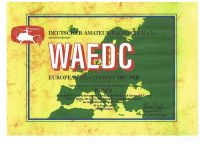 (Confirmation from DF8AA – Head of WAE):
(Confirmation from DF8AA – Head of WAE):
From: DF8AA
On 29 September 2015 20:53
To: 4U1A
Subject: Re: 4U1A WAE Status
Hello OM,
Congratulations for the new club station. We accept this call sign for the WAE-country 4U1V, the same status as 4U1VIC.
This WAE country need many WAE Award-hunters.
We are hoping for great activities.
73 Wolfgang, DF8AA – WAE-AWARD MANAGER Wolfgang Böhmer Am Wasserwerk 4 D-01796 Pirna, GERMANY.

- DXCC ARRL Rules
- DXCC ARRL DXCC List ( PDF file)
- DXCC FAQ
- DX-WORLD.net


